By MARILYN TINNIN
The term financial distress is an understatement when it comes to describing what Reverend Chris Diggs discovered when he arrived at his new pastorate in the summer of 2013. The once proud Burns United Methodist Church, the oldest African American congregation in Oxford had exactly $61 in its checking account, a mortgage on its parsonage of $199,000, and an average weekly attendance of less than twenty people. It was going to take some hefty prayers and a God-sized miracle to revive this church.
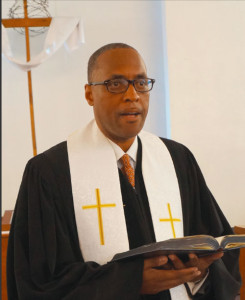 Chris was not about to let himself drown in despair. He had plenty of life experiences that had equipped him for this challenge. And so he began. His wife, Lecha, calls him the “cleanup preacher.” He was sent to fix an ailing parish.
Chris was not about to let himself drown in despair. He had plenty of life experiences that had equipped him for this challenge. And so he began. His wife, Lecha, calls him the “cleanup preacher.” He was sent to fix an ailing parish.
Today the church is debt free and has just paid cash for ten acres of land on Old Sardis Road with plans to begin construction on a new church by late summer of this year. With a growing membership and a vibrant community of ministry and outreach to young and old, black and white, this church family is not on life support any longer! The success story of Burns is also the story of Chris Diggs’ deep faith in God, his willingness to build strong relationships, and his sincere desire to love and to serve others regardless of race.
Roots
Born to an 18-year-old unmarried mother and reared on his grandparents’ farm in Athens, Mississippi, in Monroe County, Chris was dirt poor in material wealth but rich in the resources that money could never buy. His grandfather, Willie D. Diggs, was his hero, and he learned how to be a man by watching the way his grandfather lived. An auto mechanic who had lost his left leg in an accident on the job, he never let his disability destroy his life. He adapted and continued to do all the things he had always done. Chris describes a man who drove a tractor, performed his farm chores, built his home with his own hands, and provided for his family. There was no store-bought crutch, no prosthesis, and no wheelchair. Willie Diggs chopped down a tree and designed a unique crutch that did not sink in the soft ground when he leaned on it. Tenacity and resourcefulness are traits he definitely passed to his grandson.
It has always been very important in Chris’ mind to not do anything that would disappoint his “Papaw.” Mr. Diggs’ photo rests in a prime spot in Chris’ office as if to remind his grandson that obstacles are not impossibilities unless you let them be.
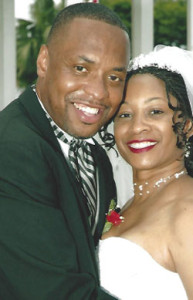
Chris and Lecha married in 2008 in Jamaica. Lecha is a pediatric nurse at Baptist Memorial Hospital in Oxford.
The Athens community in the mid-1960s was fairly isolated. Chris’ entire life was right there on the farm. He had cousins to play with, and the family’s social life occurred in totality at the close-by church. Whatever events were taking place in the world beyond Monroe County were unknown to young Chris. The Civil Rights movement that was making waves elsewhere was not something Chris had heard about. He was warm, safe, and happy on his grandparents’ farm.
In 1972 on his first day of school, six-year-old Chris was introduced to racial prejudice for the first time. The forced school busing that integrated the public schools in Mississippi was a recent enough event that there was still a lot of resentment on the part of many whites. When the big yellow school bus came bumping down the county road and opened its giant door for Chris and three of his cousins that first day, Chris’ enthusiasm for this new adventure faded quickly. There were no other African-American children on the bus, and the white children refused to let Chris and his cousins take a seat.
When one of the bigger white boys pushed Chris’ fourteen-year-old cousin, “Brite,” she pushed him back. A fight erupted and ended with “Brite’s” bloody nose and a traumatized little Chris.
Fortunately, Chris discovered the bully who had pushed his cousin was not typical of the reception he encountered at school. There were very few times, he says, in his next twelve years that he saw or felt any prejudice. His white principal and his white basketball coach were, in his words, “two of the finest men I ever met in my life.”
His principal, Jimmy Parham, gave him his first job at age fifteen, cleaning classrooms after school. The money was welcome, and Chris took the responsibility seriously. “He knew I was poor,” Chris said. But there was dignity in having a job.
Chris graduated from Hatley High School in 1984 and headed to Itawamba Community College on a basketball scholarship. “I really did not accomplish anything in those two years other than having fun with my friends,” he says. He left without his associate degree and took a job first with an insurance agency and then with the BNSF (Burlington Northern and Santa Fe) railway company. He became a brakeman and a conductor living in Columbus, but spending part of every week working in Demopolis, Alabama.
The Call
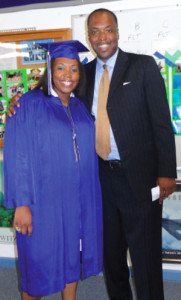
Chris congratulates his oldest daughter, Christina, on her graduation day.
Chris halfway apologizes when I ask him how he came to be a preacher. “This is the last thing I wanted to do,” he laughs. He enjoyed the job with the railroad and it provided a comfortable living. God would have to do something extreme to get his attention. And of course, God could handle “extreme.”
He was on his way to Demopolis in the wee hours of a warm summer morning in 1997 when a bright light interrupted the darkness of his car. Chris heard, whether audibly or in the way one hears the unmistakable voice of God speaking to a heart, he is not sure, but he knows he heard, “You are my child and I want you to do this for me.” He began to cry, and he couldn’t explain this away. He also did not know what to do with it as he went on to work continuing to think about the incident. What was the “this” God wanted him to pursue?
When he got off work that afternoon, he headed for the hotel where he lived during the workweek in Demopolis. He stopped off at his usual convenience store to get a cold beer. Something happened that had never happened before. The clerk apologized explaining they were completely out of the brand he always bought. Almost in jest she handed him a bumper sticker that said, “On the Move for Christ.” The memory of the early morning experience came rushing back. Coincidence?
Chris went straight to his hotel room and grabbed his Bible. What in the world could God be trying to tell him? He opened the book and his eyes fell on Matthew 4:18-20, “And Jesus, walking by the Sea of Galilee, saw two brothers…casting a net into the sea; for they were fishermen. And he saith unto them, ‘Follow me, and I will make you fishers of men.’ And they straightway left their nets, and followed him.”
He did not immediately tell anyone about the events of that day, but he did go to talk to his pastor the very next weekend. The end result was that Chris went back to Itawamba Community College and got that associate degree he had failed to complete years before. Then, he met with the District Board of the United Methodist Church and was assigned to his first church, Palestine UMC in Nettleton, about eight miles south of Tupelo.
He was content to preach on weekends and keep his job at the railroad. But God wanted more. His District Superintendent, at the time, was Dr. Carl Grubbs. He saw something in Chris that Chris did not see in himself, and he pushed Chris go deeper in his education so that more doors would open to him. He said, “If you don’t go back to school, I’m going to take your church from you.”
Facing His Own Prejudice
As Chris began to think about going back to school, he was trying to concoct a plan that would take him to Mississippi State. The problem was money. To go back to school, he needed to keep his pastorate and his job because he needed the income.
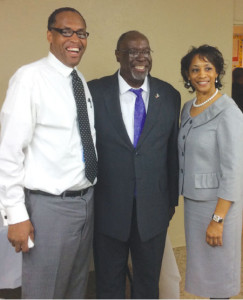
Chris, UMC Bishop James Swanson, and Lecha Diggs.
One of his Nettleton parishioners suggested he take a look at the Ole Miss Tupelo campus. He could go there and keep his job at the church as well as his job with the railroad. Chris thought that was a terrible idea telling that sweet lady, “I’ll never go to Ole Miss. They’re just a bunch of racists.” He remembered the stories he had heard about James Meredith’s enrollment in 1962. He was familiar with the Confederate flag’s presence. His pre-conceived notions of that university were all negative.
His parishioner said calmly, “Pastor, just try it.”
Fearing the threat of his district superintendent to relieve him of his pastorate, Chris decided to drive to Tupelo and check into the possibility of registering at the place he had already judged to be racist. He drove into the parking lot and came very close to turning around and leaving, but something compelled him to at least go inside and inquire about classes.
The first person he met was Gayle Wicker, Senator Roger Wicker’s wife, who is the Coordinator of Student Services at the Tupelo campus. She introduced him to a few other people, and as Chris says, “It changed my life.”
“They weren’t prejudiced. In fact, they embraced me, and they were willing to give me the opportunity to go back to school. They had night classes, day classes, online classes—they wanted to work with me. From the first day of class, it seemed like the place for me.”
Chris shares a story about his sociology professor who liked to bring up a hot political issue, present both sides, and then open up the floor for discussion. There was a life lesson that was not wasted on Chris as he appreciated the respect and acceptance he observed even when there was disagreement. He filed that under “Things I Want to Remember to Practice in Ministry.”
“I ended up graduating, and it wasn’t easy because throughout those three years I was working at night, pastoring a church, and going to school. There were days when I didn’t sleep at all.”
It was not unusual to work all night, go straight to class, and then conduct a funeral in the afternoon before taking a short nap and heading back to work. Chris had definitely tapped into the work ethic he had observed in his grandfather, Willie!
And Finally Oxford
After earning his bachelor’s degree in Liberal Arts with a minor in English, History, and Sociology, the once reluctant student went on to seminary at Gammon Theological Seminary in Atlanta. He managed to do that while pastoring a church, Rasberry Chapel UMC in Indianola, for two years.
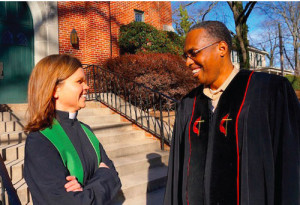
Reverend Claire Dobbs of Oxford UMC and Reverend Chris Diggs of Burns UMC swapped pulpits for a Reconciliation Sunday in 2014. Oxford UMC and Burns UMC are sister churches who work together often.
In 2013, Chris and his wife moved to Oxford to Burns UMC. Despite his positive experience on Ole Miss’ Tupelo campus, he was not sure what to expect in Oxford. He is quick to say, “God had a plan far greater than my small mind. Oxford has been the greatest thing that ever happened to me. Lecha says she never wants to leave.”
The last two years have been an education in and of themselves. Finding that things at Burns were even more challenging than he had originally been led to believe meant that he had to hit the ground running, realistically evaluating the immediate financial issues, taking stock of the malaise of the few remaining church members, and coming up with a new strategy because the present one was not improving the situation.
Chris’ vision was to not just bring solvency to the church itself, but bring real hope and opportunity to the surrounding community. The gospel he believed had a practical element to it. The immediate need was a means of generating revenue. Someone mentioned to Chris that the university had instituted new parking regulations for football game weekends and fans were desperate for parking spaces. Burns was just a few blocks from campus, and it might make sense to park cars and charge for the space. He was told he should talk to Ed Meek, Oxford citizen, entrepreneur, and one who had deep connections with the University. Ed could show him the ropes and likely help him.
Chris knocked on Ed’s door and found an instant friend. Not only was Ed willing to advise, he made a significant donation to Burns and showed up to help park cars. Their friendship, according to Chris, “has been the turning point for the entire church.”
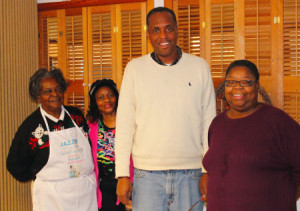
One of Burns’ ministry activities is an outreach to seniors. One popular event is the “Soup for Seniors” luncheon.
The first year Burns took in $15,000 by parking cars for football games. The next year the sum was even greater.
Chris, through his friendship with Ed, has become a regular member of a men’s weekly breakfast fellowship meeting at the iconic Beacon Restaurant. Some of Oxford’s best gather to hear inspiring speakers and discuss matters of faith. It’s laid back and there is a lot of laughter and a notable esprit de corps.
Reaching Out
Chris knew from his first day in Oxford that it is one of the most affluent cities in the state, but he also recognized there was a class of poor people there whose lives had changed very little even as progress and prosperity had come to their city. He saw the church, his church, as one that could make a difference spiritually and practically in the lives of many who lived there. And even more, he knew that those very people he desperately wanted his church to reach could and would in time reach others. That was his vision.
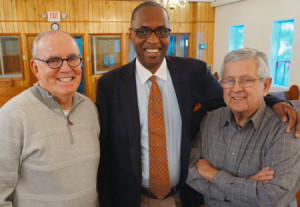
Three friends who support each other: Dick Scruggs, Chris Diggs, and Ed Meek.
He saw a need to mentor the children who lived close by and to help them reach for the opportunities that existed in their own hometown. He saw a need to help parents, too, many that were single mothers who had not completed high school. A GED program could transform a life and pave a road that did not exist before. Education and a real appreciation for what an education could do was a key component of Chris’ vision for Burns’ future.
Burns UMC began to offer a GED course and found the community hungry for it. It became evident early on that technology was so integral to daily life that the program was not going to be effective without incorporating computers. But there was no money for such.
Chris and his GED instructor, Barbara Wortham, made computers a daily prayer.
Ed Meek, who had taken such an interest in Burns, invited Chris to meet Dick Scruggs one day. The former attorney convicted of bribery had spent several years in prison. Dick had taught GED classes to inmates while in prison and he had developed a passion for giving high school dropouts a second chance to change the course of their lives.
Dick’s question for Chris was, “What can I do to help your church?” When Chris told him of the need for computers, Dick’s question was, “How many?” And Chris left with a check. Dick Scruggs has continued to be a friend and encourager to the Burns GED initiative.
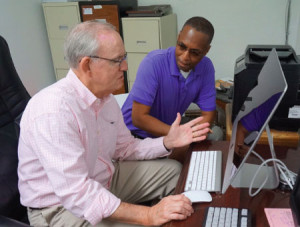
Dick Scruggs has invested time, resources, and a lot of effort in the Burns UMC GED program. Chris considers him a huge factor in its success.
As Chris says, “All kinds of people come here for the GED program and then end up coming back to worship.” Chris’ philosophy of ministry involves meeting people at the point of their need and helping them find the right path to transformation via the gospel of Jesus Christ.
Chris adds, “We want to serve those society has forgotten.”
And Racial Reconciliation
Chris does not much care for that term, “racial reconciliation.” He spoke in a sermon recently using the text of John 1:5, “The light shines in darkness, but the darkness has not understood it.”
He made the point that our racial strife today is not about black and white as much as it is about darkness and light. “So many people today are living in darkness,” he says. “Confusion and chaos is a result of darkness.”
Although he says he is not without sympathy for some of the “Black Lives Matter” movement, he finds their tactics out of line with his beliefs. He is a big proponent that “all lives matter” and simply believes real solutions are more gospel centered.
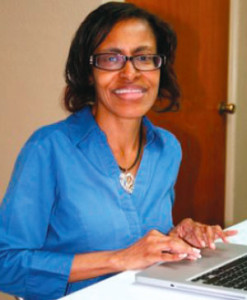
Barbara Worthum is the GED instructor at Burns UMC.
“As Christians, we have the responsibility to be a Light in this culture of hatred, division and greed.” He quotes Matthew 5:14-16, ‘You are the Light of the world. A town built on a hill cannot be hidden. Neither do people light a lamp and put it under a bowl. Instead they put it on its stand, and it gives light to everyone in the house. In the same way, let your light shine before others, that they may see your good deeds and glorify your Father in heaven.’ Christ is telling us we {Christians} are the agents of change in our society and we should let our light of Christ shine every day.”
Chris continues, “Three of the primary institutions of our culture are the family, the church, and the school. Thousands of children grow up in single parent broken homes; a great number of students drop out of school every year, and we all know about the declining numbers in our churches. We must be willing to go beyond our comfort zones and be the hands and feet of Jesus speaking life and hope into the poor letting our Light of Christ shine to those who think they have no options. If the church and Christians don’t take a stand, who will?”
Speaking of understanding and reaching out, Chris is clear. “Our problems and stresses—black or white—are the same. And the solutions come from a divine relationship with Jesus Christ.”
Amen.
To contact Reverend Diggs or to learn more about Burns United Methodist Church, visit burnsumc.org.

